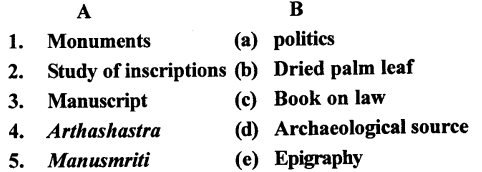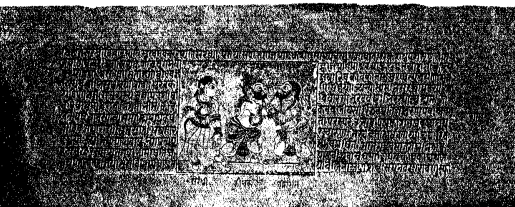The Trail History and Civics for Class 6 ICSE Solutions – Sources of History
ICSE SolutionsSelina ICSE SolutionsML Aggarwal Solutions
The Trail History and Civics for Class 6 ICSE Answers
Trail HistoryCivicsHistory & Civics Geography Biology Chemistry Physics Maths
Keywords
- History: History is a record of people, places and events of the past arranged in chronological order.
- Prehistory: Prehistory is the history of the period before writing was invented.
- Archaeology: Archaeology is the study of material remains of the distant past.
- Parchment: Parchment is the dried skin of goats and sheep used for writing.
- Sources: Sources are clues from archaeology or literature which help historians to put together a period of history. Monuments Monuments are ancient buildings such as temples, palaces and forts, which are valuable sources of information of the life and times of people in the distant past.
- Numismatics: It is a study of coins.
- Inscriptions: Inscriptions are the engraving on solid objects such as metal surfaces, stone tablets, rocks, pillars, cave walls, etc.
- Epigraphy: Epigraphy is the study of old inscriptions. Edicts Edicts are royal commands issued by the rulers. Manuscripts Manuscripts are the handwritten records of the past in the form of books.
- Religious literature: It refers to literacy writing dealing with religion.
- Secular literature: Secular literature is non-religious literature such as plays, poems, accounts of foreign travellers and other works on politics, science, etc.
EXERCISES
A. Fill in the blanks.
- History is record of people, places and events of the past, arranged in chronological order.
- The sources of history can be broadly classified into archaeological sources and literary sources.
- Inscriptions are engravings on solid objects.
- Edicts are royal commands issued by kings.
- Handwritten records of the past are known as Manuscripts
- Literary source material can be divided into religious literature and secular literature.
B. Match the following.

Answer:


C. Choose the correct answer:
1. Prehistory is the history of the period before writing/ wheel/paper was invented.
Ans. Prehistory is the history of the period before writing was invented.
2. The study of coins is known as epigraphy/numismatics/ archaeology.
Ans. The study of coins is known as numismatics.
3. Harshacharita/Indika/Manusmriti deals with the biography of a ruler.
Ans. Harshacharita deals with the biography of a ruler.
4. The Greek ambassador in Chandragupta Maurya’s court was Fa Hein/Hiuen Tsang/Megasthenes.
Ans. The Greek ambassador in Chandragupta Maurya’s court was Megasthenes.
5. Kalidasa/Banabhatta/Kautilya wrote
Ans. Kalidasa wrote Meghaduta.
6. Fa Hien and Hiuen Tsang were the Greek/Chinese/ Japanese travellers who came to India.
Ans. Fa Hien and Hiuen Tsang were the Chinese travellers who came to India.
D. State whether the following are true or false.
- History is only a record of great kings and queens.
False. History is a record of people, places and events of the past arranged in chronological order - The study of old inscriptions is known as epigraphy.
True. - The Angas are the religious literature of the Buddhists.
False. The Angas are the religious literature of the Jain. - Banabhatta wrote
True.
- Panchatantra is a part of religious literature.
False. Panchatantra is a part of secular literature.
E. Answer the following questions in one or two words/ sentences:
Question 1.
What are that two groups in which the sources of history are broadly divided into?
Answer:
The sources of history can be broadly divided into two groups.
- Archaeological Sources.
- Literary Sources
Question 2.
What are monuments?
Answer:
Monuments are ancient buildings such as temples, palaces and forts, which are valuable sources of information of the life and time of people in the distant past.
Question 3.
What are inscriptions?
Answer:
Inscriptions are the engravings on solid objects such as metal surface, stone tablets, rocks, pillars, cave walls, etc.
Question 4.
Name any two archaeological objects that provide important clues to the history of humans in the Ancient Period.
Answer:
Stones, metal tools, pottery, monuments, coins and figures are archaeological objects, that provide important clues to the history of humans in the Ancient Period.
Question 5.
What is the only source of information of the Harappan Civilization?
Answer:
Archaeological remains are the only sources of information for this period. The discovery of the Harappan sites in 1921 brought to light a highly advanced Indian civilization that flourished more than 4,500 years ago.
Question 6.
Name any one important source of information about the Mauryan period.
Answer:
Indika, written by Megasthenes gives valuable information about the Mauryan administration and society.
Question 7.
What are manuscripts?
Answer:
Manuscripts are the hand written records of the past in the form of books.
Question 8.
What were the surface on which the manuscripts were written?
Answer:
Manuscripts were written on a variety of surfaces such as dried sheep or goat skin, dried palm leaf, the bark of birch trees and much later, on paper.
Question 9.
What do you understand by secular literature? Give an example.
Answer:
Non-religious literature is known as secular literature, it includes biographies of important historical characters. For example Harshacharita by Banabhatta, dramas and poems by famous writers Kalidasa, folk tales such as Panchatantra.
F. Answer the following questions briefly.
Question 1.
What is history? Why do we study history?
Answer:
History is a record of people, places and events of the past, arranged in chronological order.
We study history because it tells us about the problems of our ancestors, their aspirations as well as their achievements.
Question 2.
What is the difference between prehistory and history?
Answer:
The main difference between prehistory and history is that we have written records in history and have no written records in prehistory.
Question 3.
What is archaeology? Why is it so important for the study of prehistory?
Answer:
Archaeology is the study of material remains of distant past. Archaeology is so important for the study of prehistory
because we have no written records, only the materials like stones, metal tools, pottery, images, coins, monuments, jewellery and figures are very helpful in the study of past.
Question 4.
What information do we get from inscriptions? Why are inscriptions a reliable source of information?
Answer:
The Inscriptions provide us the information about rulers, the extent of their empires, important events and also about the religious and cultural life of people in a particular period. Inscriptions are reliable source of information because they were written during the reign of great kings and are still intact in their original form.
Question 5.
What is the study of coins known as? Why are coins considered an important part of ancient history?
Answer:
The study of coins is known as numismatics. Numerous gold, silver, copper and lead coins have been found.
The coins are an important source of information about the reign of kings the extent of their empires, economic conditions, trade, art and religion of that era. The metal or alloy used also indicates the level of scientific advancement and prosperity during that age.
Question 6.
Explain the two categories of literary sources. Give two examples of each category
Answer:
Literary source can be divided into two categories
- Religious literature : Ancient Indian literature is right and varied. Books and manuscripts dealing with religion are referred to as religious literature. For example the Vedas, Ramayana and Mahabharata.
- Secular literature: Non-religious literature is known as secular literature, it includes biographies of important historical characters. For example Harshacharita by Banabhatta, dramas and poems by famous writers Kalidasa, folk tales such as Panchatantra.
G Picture study.
The picture below is a painting depicting a scene from the Mahabharata.

1. What kind of source of history is this?
Ans. It is a Literary source of history.
2.Is this religious or secular in nature?
Ans. This is religious in nature.
3. What information does this kind of source reveal?
Ans. This sources of history have helped historians to reconstruct the distant past and give a fairly accurate picture of ancient India.
OTHER IMPORTANT QUESTIONS
Question 1.
Who are Historians?
Answer:
Historians are people who study and tell us about the past. They gather information from many sources and help us to understand how people lived and worked form the earliest times to the present day.
Question 2.
What are Edicts?
Answer:
Edicts are royal commands issued by the rulers for example.
The Ashokan edicts inscribed on rocks and pillars.
Question 3.
How did Ashokan edicts help modern historians?
Answer:
The Ashokan edicts helped modem historians to reconstruct important facts about the Mauryan period.
Question 4.
Name some Religious Literature?
Answer:
Religious Literature are following:-
- The Vedas
- Ramayana and Mahabharata
- The Gita and Puranas
- The Jain Angas and Buddist Tripitakas
Question 5.
Write the Secular Literature?
Answer:
- Harashacharita by Banabhatta
- Dramas and Poems by Kalidasa
- Folk ta’es such as Panchatantra
- Works on politics such as Kautilya’s Arthanshatra
- Books of law such as Manusmriti
Question 6.
Name the foreign travellers who visited India?
Answer:
- Megasthenes (The Greek ambassador in the court of Chandragupta Maurya)
- Fa Hien (The Chinese travellers)
- HiuenTsang
Question 7.
Who wrote Indika and what type of information it provides us.
Answer:
Indika is written by Megasthenes which gives valuable information about the Mauryan administration and society.
Question 8.
Distinguish between Manuscripts and Inscriptions.
Answer:
Manuscripts
These manuscrips were prepared by a few learned men of these age in different languages and scripts.
Inscriptions
These writings are engraved on stones rocks and pillars or on metal as pricks
Question 9.
Distinguish between Archaeological sources and literary sources.
Answer:
- Archaeological Sources— These sources provides no written records. Historians depend on archeological evidence such as the remains of monuments or ancients buildings, coins, pottery, tool, paintings and images etc.
- Literaiy Sources— Literaiy sources provides written records not on paper but found on various objects like dried sheep or goat skin, copper, pillars and stones but later on paper.